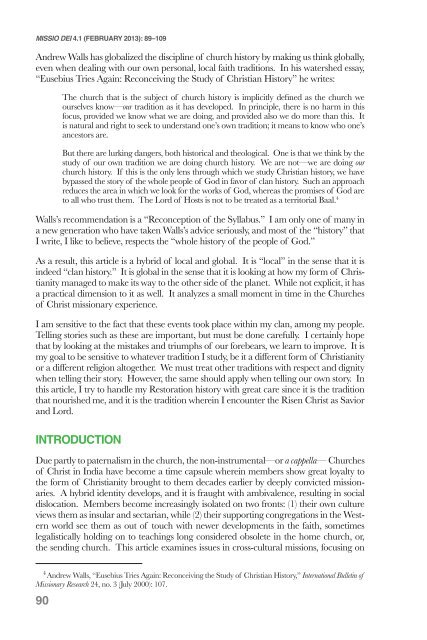VULNERABLE MISSION
VULNERABLE MISSION
VULNERABLE MISSION
Create successful ePaper yourself
Turn your PDF publications into a flip-book with our unique Google optimized e-Paper software.
MISSIO DEI 4.1 (FEBRUARY 2013): 89–109<br />
Andrew Walls has globalized the discipline of church history by making us think globally,<br />
even when dealing with our own personal, local faith traditions. In his watershed essay,<br />
“Eusebius Tries Again: Reconceiving the Study of Christian History” he writes:<br />
90<br />
The church that is the subject of church history is implicitly defined as the church we<br />
ourselves know—our tradition as it has developed. In principle, there is no harm in this<br />
focus, provided we know what we are doing, and provided also we do more than this. It<br />
is natural and right to seek to understand one’s own tradition; it means to know who one’s<br />
ancestors are.<br />
But there are lurking dangers, both historical and theological. One is that we think by the<br />
study of our own tradition we are doing church history. We are not—we are doing our<br />
church history. If this is the only lens through which we study Christian history, we have<br />
bypassed the story of the whole people of God in favor of clan history. Such an approach<br />
reduces the area in which we look for the works of God, whereas the promises of God are<br />
to all who trust them. The Lord of Hosts is not to be treated as a territorial Baal. 4<br />
Walls’s recommendation is a “Reconception of the Syllabus.” I am only one of many in<br />
a new generation who have taken Walls’s advice seriously, and most of the “history” that<br />
I write, I like to believe, respects the “whole history of the people of God.”<br />
As a result, this article is a hybrid of local and global. It is “local” in the sense that it is<br />
indeed “clan history.” It is global in the sense that it is looking at how my form of Christianity<br />
managed to make its way to the other side of the planet. While not explicit, it has<br />
a practical dimension to it as well. It analyzes a small moment in time in the Churches<br />
of Christ missionary experience.<br />
I am sensitive to the fact that these events took place within my clan, among my people.<br />
Telling stories such as these are important, but must be done carefully. I certainly hope<br />
that by looking at the mistakes and triumphs of our forebears, we learn to improve. It is<br />
my goal to be sensitive to whatever tradition I study, be it a different form of Christianity<br />
or a different religion altogether. We must treat other traditions with respect and dignity<br />
when telling their story. However, the same should apply when telling our own story. In<br />
this article, I try to handle my Restoration history with great care since it is the tradition<br />
that nourished me, and it is the tradition wherein I encounter the Risen Christ as Savior<br />
and Lord.<br />
INTRODUCTION<br />
Due partly to paternalism in the church, the non-instrumental—or a cappella— Churches<br />
of Christ in India have become a time capsule wherein members show great loyalty to<br />
the form of Christianity brought to them decades earlier by deeply convicted missionaries.<br />
A hybrid identity develops, and it is fraught with ambivalence, resulting in social<br />
dislocation. Members become increasingly isolated on two fronts: (1) their own culture<br />
views them as insular and sectarian, while (2) their supporting congregations in the Western<br />
world see them as out of touch with newer developments in the faith, sometimes<br />
legalistically holding on to teachings long considered obsolete in the home church, or,<br />
the sending church. This article examines issues in cross-cultural missions, focusing on<br />
4 Andrew Walls, “Eusebius Tries Again: Reconceiving the Study of Christian History,” International Bulletin of<br />
Missionary Research 24, no. 3 (July 2000): 107.


